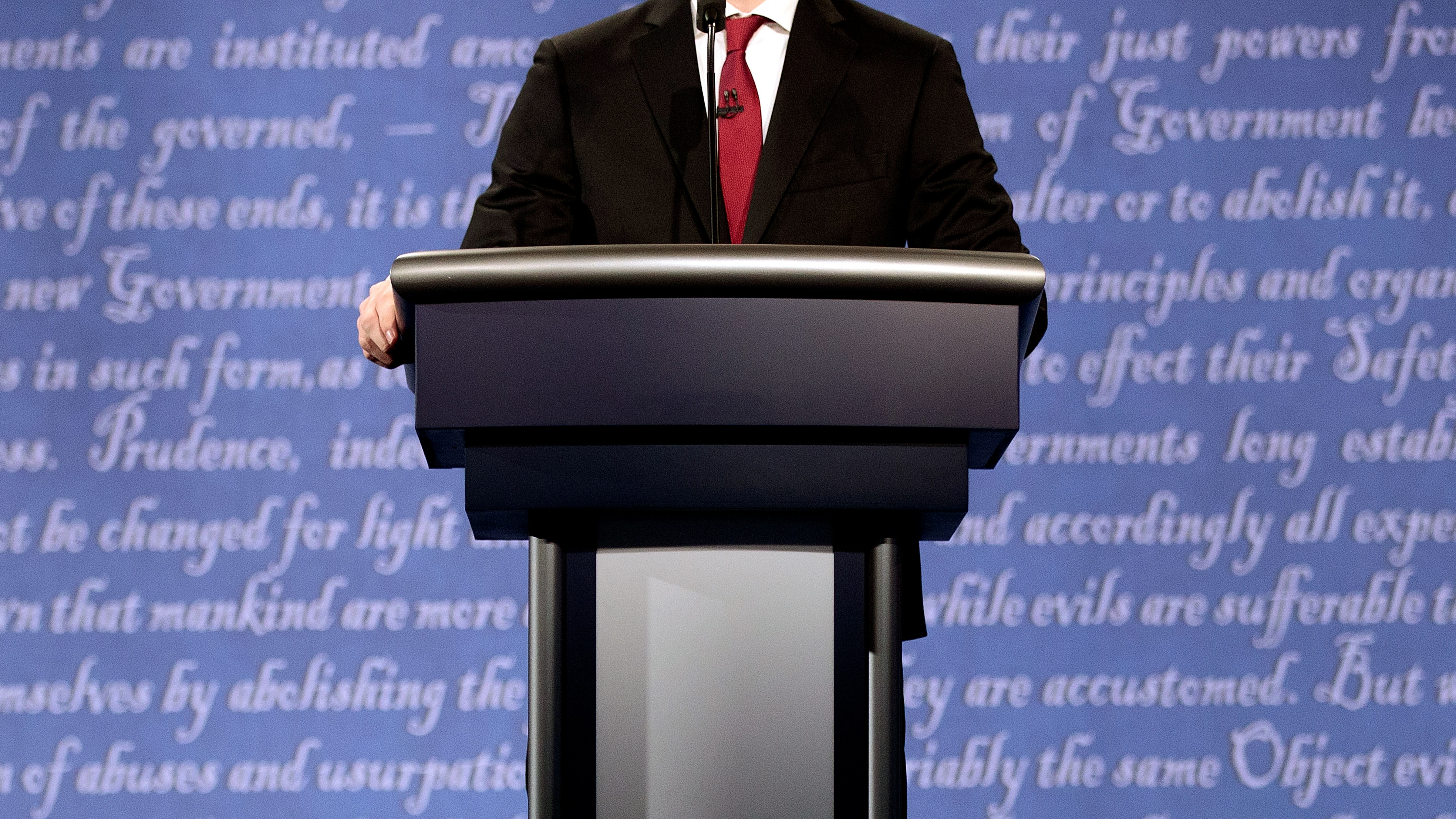Trump’s Depravity Will Not Cost Him This Election
7 min read
This is an edition of The Atlantic Daily, a newsletter that guides you through the biggest stories of the day, helps you discover new ideas, and recommends the best in culture. Sign up for it here.
Yesterday, The Atlantic published another astonishing story by editor in chief Jeffrey Goldberg about Trump’s hatred of the military. The reporting included, among other things, the retired general and former Trump chief of staff John Kelly confirming on the record that “Trump used the terms suckers and losers to describe soldiers who gave their lives in the defense of our country,” a fact that Goldberg had first reported in September 2020. (Team Trump, unsurprisingly, continues to deny the story.) Not long after the publication of yesterday’s article, The New York Times published excerpts from interviews with Kelly in which Kelly said—on tape, no less—that Trump fits the definition of a fascist.
Like many of Trump’s critics, I’ve repeatedly asked one question over the years: What’s it going to take?When will Republican leaders and millions of Trump voters finally see the immorality of supporting such a man? Surely, with these latest revelations, we’ve reached the Moment, the Turning Point, the Line in the Sand, right?
Wrong. As New Hampshire Governor Chris Sununu—one of the many former Trump critics now back on the Trump train—said today on CNN in response to a question about Kelly’s comments: “With a guy like [Trump], it’s kinda baked into the vote.”
The belief that at some point Trump voters will have finally had enough is an ordinary human response to seeing people you care about—in this case fellow citizens—associate with someone you know to be awful. Much like watching a friend in an unhealthy relationship, you think that each new outrage is going to be the one that provokes the final split, and yet it never does: Your friend, instead of breaking off the relationship, makes excuses. He didn’t mean it. You don’t understand him like I do.
But this analogy is wrong, because it’s based on the faulty assumption that one of the people in the relationship is unhappy. Maybe the better analogy is the friend you didn’t know very well in high school, someone who perhaps was quiet and not very popular, who shows up at your 20th reunion on the arm of a loudmouthed boor—think a cross between Herb Tarlek and David Duke—who tells offensive stories and racist jokes. She thinks he’s wonderful and laughs at everything he says.
But what she really enjoys, all these years after high school, is how uncomfortable he’s making you.
And this, in brief, is the problem for Kamala Harris in this election. She and others have likely hoped that, at some point, Trump will reveal himself as such an obvious, existential threat that even many Republican voters will walk away from him. (She delivered a short statement today emphasizing Kelly’s comments.) For millions of the GOP faithful, however, Trump’s daily attempts to breach new frontiers of hideousness are not offensive but reassuring. They want Trump to be awful—precisely because the people they view as their political foes will be so appalled if he wins. If Trump’s campaign was focused on handing out tax breaks and lowering gas prices, he’d be losing, because for his base, none of that yawn-inducing policy stuff is transgressive enough to be exciting. (Just ask Nikki Haley and Ron DeSantis, who each in their own way tried to run as a Trump alternative.)
Some Trump voters may believe his lies. But plenty more want Trump to be terrifying and stomach-turning so that reelecting him will be a fully realized act of social revenge. Harris cannot propose any policy, offer any benefit, or adopt any position that competes with that feeling.
Exactly why so many Americans feel this way is a complicated story—I wrote an entire book about it—but a toxic combination of social resentment, entitlement, and racial insecurity drives many Trump voters to believe not only that other Americans are looking down on them but that they are doing so while living an undeservedly good life. These others must be punished or at least brought down to a common level of misery to balance the scales, and Trump is the guy to do it.
This unfocused rage is an addiction fed by Trump and conservative media, and the MAGA base wants it stoked continuously. If Trump were suddenly to become a sensible person who started talking coherently about trade policy and defense budgets, they would feel betrayed, like hard drinkers in a tavern who suspect that the bartender is watering down the high-proof stuff. My friend Jonathan Last—the editor of The Bulwark—has been wondering about this same problem, and says that some Trump supporters “are not (yet) comfortable with admitting this truth to themselves.”
He believes that most of them are either caught in a comforting blanket of denial or the fog of detached nihilism. I’m not so sure. I am struck by how often Trump voters—and I am speaking here of rank-and-file voters, not crass opportunists such as Sununu or wealthy wingmen such as Elon Musk—are almost incapable of articulating support for Trump without reference to what Trump will do to other people or without descending into “whataboutism” about Harris. (Yes, Trump said bad things, but what about Harris’s position on gender-affirming medical care for federal prisoners,as if liberal policies are no different from, say, threats to use the military against American citizens.)
Where all of this leaves us is that Harris could lose the election, not because she didn’t offer the right policies, or give enough interviews, or inspire enough people. She could lose because just enough people in four or five states flatly don’t care about any of that.
Some voters, to be sure, have bought into the mindless tropes that Democrats are communists or Marxists or some other term they don’t understand. But the truly loyal Trump voters are people who are burning with humiliation. They can’t get over the trauma of losing in 2020, the shame of buying Trump’s lie about rigged elections, and the shock of seeing each of their champions—Tucker Carlson, Rudy Giuliani, Steve Bannon, and others—turn out to be liars and charlatans who have been fired, financially imperiled, or even imprisoned.
Rather than reckoning with the greatest mistake they’ve ever made at the ballot box, they have decided that their only recourse is to put Trump back in the Oval Office. For them, restoring Trump would be both vindication and vengeance. It would prove that 2016 was not a fluke, and horrify people both they and Trump hate.
I am not hopeful that Democrats will rally in large enough numbers to prevent this outcome. Harris’s campaign has wisely avoided a slew of traps and pitfalls, but too many Democrats are reverting to form, complaining about wonky intraparty policy differences while Trump fulminates against democracy itself. (Some of the nation’s media outlets have contributed to this sense of complacency by “sanewashing” Trump’s most unhinged moments.) I am also not sure that swing voters will really swing against Trump, but one ray of hope is that revelations from people like Kelly do seem to matter: A new analysis indicates that voters trust criticism from Trump’s former colleagues and allies more than standard political zingers from the opposition.
I genuinely want to be wrong about all this. I hope that many of the people now supporting Trump will have an attack of conscience on their way to their polling station. But as Trump’s running mate, J. D. Vance, once wrote for The Atlantic, Trump is “cultural heroin,” and the hard choice of civic virtue will never match the rush of racism, hatred, and revenge that Trump offers in its place.
Related:
- Trump: “I need the kind of generals that Hitler had.”
- Donald Trump’s fascist romp
Here are three new stories from The Atlantic:
- The three factors that will decide the election
- The positions that the Democrats won’t defend
- Why people itch and how to stop it
Today’s News
- In response to comments that the former Trump chief of staff John Kelly made to The New York Times, White House Press Secretary Karine Jean-Pierre said that President Joe Biden believes that Donald Trump is a fascist.
- An estimated 3,000 North Korean soldiers arrived in Russia this month, according to the White House. Their role in the region remains unclear.
- At least five people died and 22 people were injured at the headquarters of a Turkish state-run military manufacturer, in what Turkish officials described as a “terrorist attack.”
Dispatches
- Work in Progress: Tuition-free medical school might be making health-care inequality worse, Rose Horowitch writes.
Explore all of our newsletters here.
Evening Read

ChatGPT Doesn’t Have to Ruin College
By Tyler Austin Harper
Two of them were sprawled out on a long concrete bench in front of the main Haverford College library, one scribbling in a battered spiral-ring notebook, the other making annotations in the white margins of a novel. Three more sat on the ground beneath them, crisscross-applesauce, chatting about classes …
I said I was sorry to interrupt them, and they were kind enough to pretend that I hadn’t. I explained that I’m a writer, interested in how artificial intelligence is affecting higher education, particularly the humanities. When I asked whether they felt that ChatGPT-assisted cheating was common on campus, they looked at me like I had three heads.
Read the full article.
More From The Atlantic
- Welcome to the trolligarchy.
- Hating the regime, waiting for war
- Why Randy Newman is least loved for his best work
Culture Break

Read. These are six political memoirs that are actually worth reading, Franklin Foer writes.
Debate. Are obscure meme costumes sucking the joy out of Halloween?
Play our daily crossword.
Stephanie Bai contributed to this newsletter.
When you buy a book using a link in this newsletter, we receive a commission. Thank you for supporting The Atlantic.



